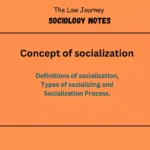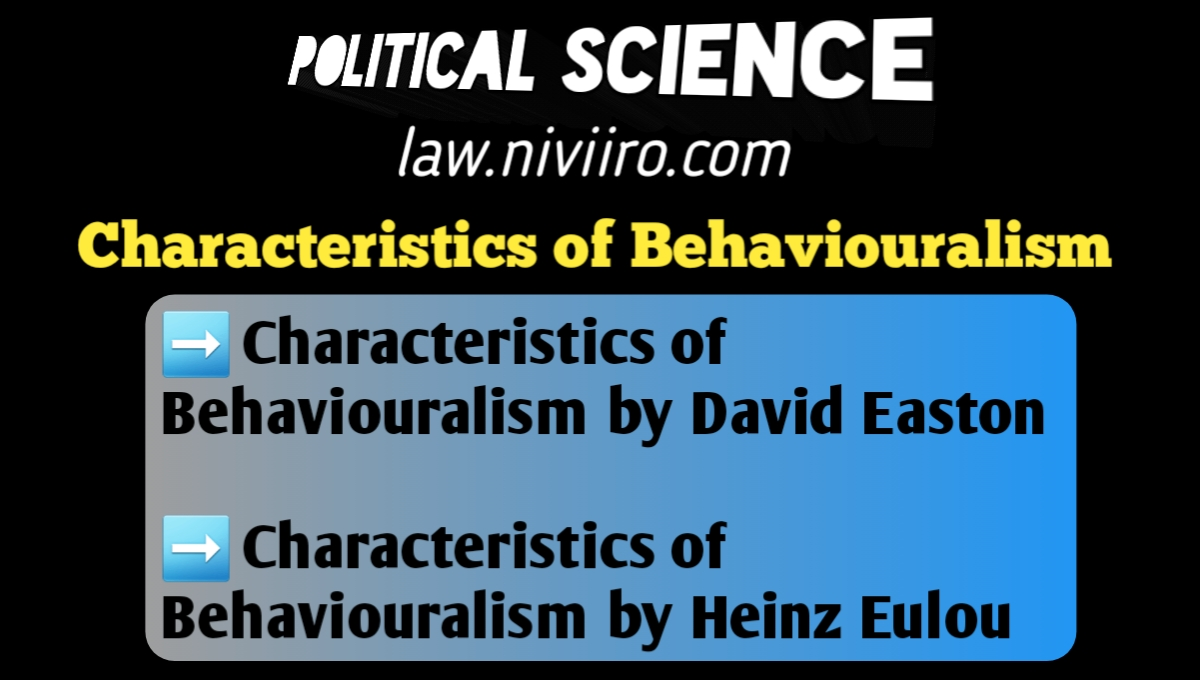Characteristics of behaviouralism by David Easton ;
David Easton, one of the most important exponents and founders of the behaviouralist political school of thought, has summed up behaviouralism around eight characteristic features. These are: (1) Value free; (2) Verification: (3) Techniques; (4) Regularities; (5) Quantification: (6) Systematisation, (7) Integration and (8) Pure Science.
1. Value-free
The behavioural approach is devoid of value. Facts are distinguished from values. The research should be value-free, so that the researcher is not tempted to evaluate a political topic via the lens of his own subjective valuational judgement. Moral and ethical concerns should be set aside in order to provide a scientific explanation.
2. Verification
Behaviouralists also think that for knowledge to be genuine, it must consist of propositions that have been empirically tested, and that all evidence must be based on observation.
3. Techniques
Behaviouralists place a high value on using proper data acquisition and interpretation methodologies, as well as using research tools or methods that yield accurate, trustworthy, and comparable data.
4. Regularities
Political behaviour, according to behavioralists, has discernible uniformities that can be articulated in generalisations or theories capable of understanding and forecasting political happenings.
5. Quantification
Data collection isn’t enough. They must be quantified and measured. Accuracy must be assured. This is accomplished through rigorous measurement and data manipulation processes. Only quantifiable evidence can be used to validate research findings.
6. Systematisation
The behaviourists insist that political science research should be systematic, which means that it should be ‘theory-oriented and theory-directed,’ that theory and research should be ‘closely inter-related parts of a coherent and orderly body of knowledge,’ and that’research untutored by theory may prove trivial, and theory unsupported by data, futile.’ Analysis, explanation, and prediction are the foundations of systematisation.
7. Integration
Because behaviouralists believe in an inter-disciplinary approach, they do not regard political science as a discrete discipline. It should be combined with other social sciences such as psychology, sociology, economics, anthropology, and so on. Because knowledge is indivisible, it must be unified.
8. Pure Science
Behaviouralists argue that research should be pure or completely verifiable by evidence, regardless of whether or not it applies to a specific societal situation. The ultimate goal should be to make social sciences as important as natural sciences.
Characteristics of Behaviouralism as given by Heinz Eulou :
Eulou has described the four characteristics of behaviouralism as given below ;
Human Behaviour Studies
It describes the behaviour of individuals and social groups as the unit or object of both theoretical and empirical research, rather than events, structures, organisations, or ideologies.
Inter Disciplinary Focus
It aims to place theory and research in the same frame of reference as social psychology, sociology, and cultural anthropology. In other words, it favours an inter-disciplinary approach.
Empirical Research
It emphasises the interconnectedness of theory and research. For empirical research, theoretical problems must be articulated in operational terms. In turn, empirical discoveries should influence the development of political theory. It is self-consciously theoretical in nature.
Scientific Method
It aims to establish rigorous empirical research methodology and to apply exact analytical tools to problems of political behaviour. It is an abbreviation for the scientific technique of study.
Related Post
Explain the Characteristics of behaviouralism by David Easton ?
1. Value-free
The behavioural approach is devoid of value. Facts are distinguished from values. The research should be value-free, so that the researcher is not tempted to evaluate a political topic via the lens of his own subjective valuational judgement. Moral and ethical concerns should be set aside in order to provide a scientific explanation.
2. Verification
Behaviouralists also think that for knowledge to be genuine, it must consist of propositions that have been empirically tested, and that all evidence must be based on observation.
3. Techniques
Behaviouralists place a high value on using proper data acquisition and interpretation methodologies, as well as using research tools or methods that yield accurate, trustworthy, and comparable data………………….
Expalin the Characteristics of Behaviouralism as given by Heinz Eulou ?
Human Behaviour Studies
It describes the behaviour of individuals and social groups as the unit or object of both theoretical and empirical research, rather than events, structures, organisations, or ideologies.
Inter Disciplinary Focus
It aims to place theory and research in the same frame of reference as social psychology, sociology, and cultural anthropology. In other words, it favours an inter-disciplinary approach…..
References
- J.C. Johari, Political Science
- Prof. S.L. Verma, Modern Political Theory
- M.P. Jain, Political Theory liberal and Marxiam
- Prof. H.C. Verma, Modern Political Theory
- V.D. Mahajan, Political Theory
- R.C. Agarwal, Political Theory
Sources




















